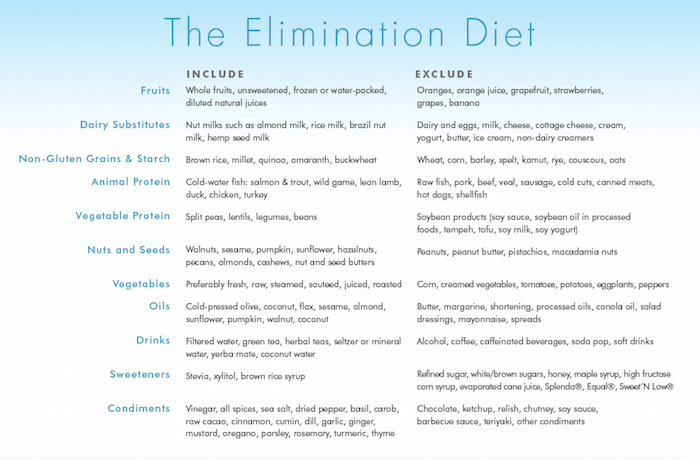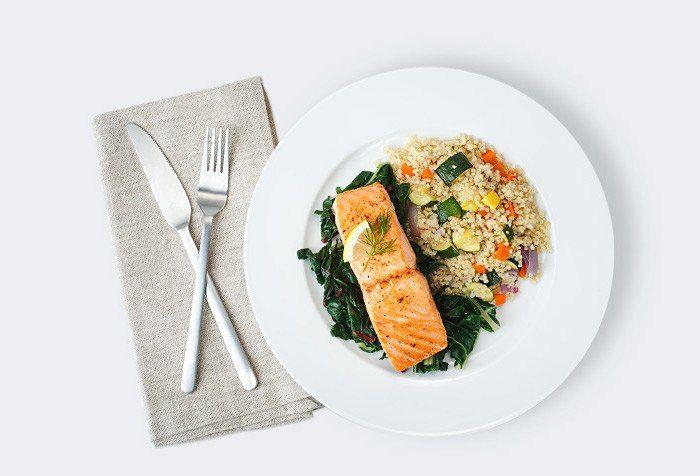The Elimination Diet: Everything You Need to Know About the Buzzy Diet
“Lose 10 Pounds in 10 Days!” and “Get the Body You’ve Always Wanted” are some common come-ons that you might hear this time of year about ways to (supposedly) get healthy. But what if the tagline for a diet was “Figure Out What’s Keeping You Up At Night” or “Finally, Get Rid of Your Chronic Headaches.” Now, we're talking.
Enter: the elimination diet. A way of eating that's more about getting healthy and relieving ailments, by removing various problem-causing foods from your diet, than fitting into a pair of skinny jeans. It’s also a huge buzz word lately.
"Elimination diet" was number nine on Yahoo’s list of top-searched diets of 2014. The nation's top progressive docs, Frank Lipman, MD, Mark Hyman, MD, and Alejandro Junger, MD, all prescribe some form of it. Celebrities, like Gwyneth Paltrow, have tried it and trendy health coaches, like the ones at Urban Detox Club, recommend it to their clients. So what is it exactly?
If you think about it, you probably have some “ailment”—whether it’s a chronic stuffy nose, trouble sleeping, or headaches that you've wanted to get rid of (and your regular remedies aren’t exactly doing the trick).

{{post.sponsorText}}
Los Angeles-based Dr. Junger, whose books called Clean and Clean Eats give some indication as to his stance, says that certain foods might be the cause of those problems. And cutting them out can help you put the puzzle pieces together about why you’re experiencing these conditions—largely by helping you learn which foods might be making you feel crappy.
Here’s what you need to know about the elimination diet before your next grocery haul—or, to be more accurate, your kitchen purge.
What is the elimination diet and how does it work?
While the execution might variety in what you eliminate and for how long, the idea is that you are removing foods from your diet, for a decent amount of time, and reintroducing them back into your diet, one at a time.
This way, when you reintroduce foods back into your diet, it’s easier to tell whether milk, or tomatoes, for example, is contributing to your hives and headaches.
“You never know if the ailment is being caused by one thing, or a combination of two things, until you take them all out for at least two to three weeks, and then start to reintroduce them back in,” says Dr. Junger. (Talk to a doctor if you’re seriously considering the elimination diet.)
What foods are eliminated on the elimination diet?
For the first phase of the elimination diet, Dr. Junger and many other functional medicine physicians recommend cutting out things like fruits, like oranges and bananas, certain vegetables, like tomatoes, potatoes, peppers, and eggplants (which are in the nightshade family), eggs, milk, cheese, wheat, corn, raw fish, pork, beef, soybean products, peanuts, butter, processed oils, alcohol, coffee, refined sugar, chocolate, ketchup, and more.
The re-introduction process is a whole other story, and if you're doing it to really figure out a persistent health issue, doing it under an MD's or detox expert's supervision is very wise.

So why are doctors, and others, recommending it—and what does it accomplish?
“People come to me with all sorts of problems—tiredness, bloating, migraines, lack of sleep, eczema, arthritis, autoimmune diseases, diabetes, and the list goes on and on—and sometimes I need blood tests or X-rays. But the first thing I do with most people is put them on an elimination diet,” Dr. Junger says. “Generally 60 percent of the time, just putting them on the diet either improves the situation or resolves it.”
For Jen Morris, a health coach and co-founder of Urban Detox Club, clients will often come to her saying that their doctor recommended they try some sort of elimination diet, so she works with them on either a 12-day or 30-day cleanse to remove the common allergens like gluten, dairy, coffee, soda, and meat.

Who's actually tried this and has been successful on it?
For Seamus Mullen, a celebrity chef, author, and owner of acclaimed West Village eatery Tertulia, it was his battle with rheumatoid arthritis, an incurable autoimmune disease, that led him to the elimination diet.
“[Dr. Lipman] really helped me. We started with a series of cleanses to address my diet on how food might be affecting it—and how I felt,” says Mullen. He cut out all prepared and packaged foods from his diet, then he removed gluten, sugar, and grains.
“What I found was when you get your body to a point where you clean things up, then, when you add things back in, you are more cognizant of what might be triggering a reaction,” Mullen says. “It’s a process. It takes a while to really absorb information and listen to your body over time and see the slow effect.”
Another success story is wellness-minded Gwyneth Paltrow, who noted, in her book, It's All Good, that working with Dr. Junger and doing the elimination diet helped her get healthy. And many of the recipes in her book are elimination-diet approved.
How does this all relate to gut health?
“Why are the foods that are eliminated, eliminated? On some level they hinder the balance of things in the body,” Dr. Junger says.
Whether the foods cause allergic reactions, have too many toxins, are too acidic, or are difficult to digest, “the effect is that somehow they cause problems in the body,” Dr. Junger says. “And many of these problems start in the gut.”
Food allergies and chemicals added to food can cause a leaky gut, which then turns into a cyclical relationship, because a leaky gut can cause sicknesses and affect your immune system.
“[The gut] is the first point of contact with food and our organisms. That’s where our body should be able to absorb it into the blood or eliminate it,” Dr. Junger says. “A leaky gut happens because the foods are irritants—certain foods will interact with the gut wall and cause it to break down.”
Caffeine making it hard for you sleep at night is a bit of a no-brainer, but oranges, should you learn they're causing the problem for you? Now, that's a game changer. —Molly Gallagher
For more information on Dr. Junger, visit www.cleanprogram.com and for more information on Urban Detox Club, visit www.urbandetoxclub.com
Loading More Posts...
